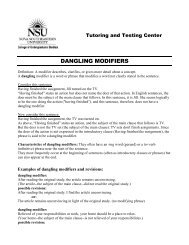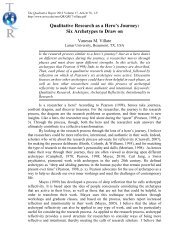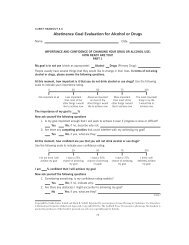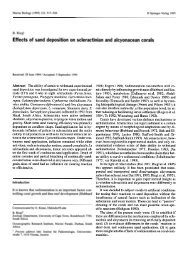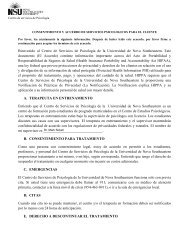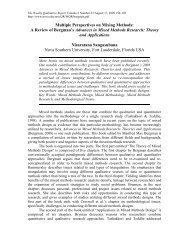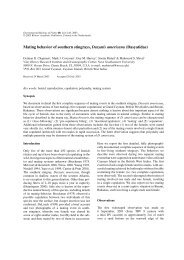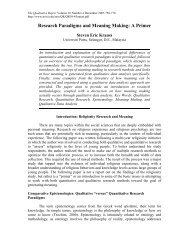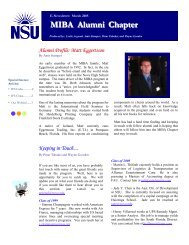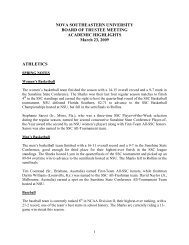Contextualizing Theories and Practices of Bricolage Research
Contextualizing Theories and Practices of Bricolage Research
Contextualizing Theories and Practices of Bricolage Research
Create successful ePaper yourself
Turn your PDF publications into a flip-book with our unique Google optimized e-Paper software.
6 The Qualitative Report 2012<br />
Bricoleurs allow for dynamics <strong>and</strong> contexts to dictate which questions get asked, which<br />
methods to employ <strong>and</strong> which interpretive perspectives to use. This means bricoleurs<br />
have an aptness for creativity -- they know how to artistically combine theories,<br />
techniques, <strong>and</strong> methods. Furthermore, they are able to create their own methodological<br />
tools when needed. Reiterated by Denzin <strong>and</strong> Lincoln, "if a researcher needs to invent, or<br />
piece together new tools or techniques, he or she will do so" (p. 4).<br />
Theoretical bricoleurs, for Denzin <strong>and</strong> Lincoln, work through, <strong>and</strong> between,<br />
multiple theoretical paradigms: “the theoretical bricoleur reads widely <strong>and</strong> is<br />
knowledgeable about the many interpretive paradigms (e.g., feminism, marxism, cultural<br />
studies, constructivism, queer theory) that can be brought to any particular problem” (p.<br />
8). From varied, sometimes conflicting, perspectives, a theoretical bricoleur performs<br />
multiple readings on an artifact, text, or phenomenon. This process allows bricoleurs to<br />
underst<strong>and</strong> the different theoretical contexts in which an object can be interpreted --<br />
providing a multi-perspectival, post-structuralist perspective, showing the plurality <strong>of</strong><br />
complexities that influence a phenomenon.<br />
For example, a researcher examining workplace bullying from a feminist<br />
perspective might examine how the construction <strong>of</strong> gender hierarchies <strong>and</strong> norms, <strong>and</strong><br />
patriarchy, impact bullying. However, a theoretical bricoleur would not stop their<br />
analysis at this plateau. Rather, they might begin with a feminist reading, <strong>and</strong> then loop<br />
their analysis through another theoretical perspective. Perhaps she/he may find insights<br />
from neo-Marxist analysis appropriate. If so, the theoretical bricoleur may examine how<br />
neo-liberal capitalist contexts enforce ideals <strong>of</strong> competition in the workplace.<br />
Additionally, the theoretical bricoleur may notice heterosexist discourses operating<br />
within a given context, <strong>and</strong> therefore draws from queer theories to examine how notions<br />
<strong>of</strong> heteronormativity underpin the concept <strong>of</strong> bullying. A multi-perspectival description,<br />
though not "more correct” than any one interpretation on its own, adds depth, rigour <strong>and</strong><br />
multiplicity to inquiry. In the case <strong>of</strong> research that focuses on workplace bullying, it is<br />
easy to see that no one theoretical position can provide a holistic image <strong>of</strong> the complexity<br />
<strong>of</strong> the issue. The bricolage, as Kincheloe <strong>and</strong> Berry (2004) explain, exists out <strong>of</strong> an<br />
appreciation <strong>of</strong> the complexity <strong>of</strong> the lived world. Further, it exists for questions that<br />
don’t lend themselves to easy answers.<br />
For Denzin <strong>and</strong> Lincoln, political bricoleurs are researchers who are aware <strong>of</strong> how<br />
knowledge <strong>and</strong> power are connected. They explain: “The political bricoleur is aware that<br />
science is power, for all research findings have political implications. There is no value<br />
free science" (p. 6). Embracing this underst<strong>and</strong>ing, like those educators who adopt critical<br />
pedagogies, political bricoleurs develop counter-hegemonic forms <strong>of</strong> inquiry that rally<br />
against oppressive social constructs <strong>and</strong> injustices. As their aim, political bricoleurs<br />
produce knowledge that benefits those who are disenfranchised by everyday taken-forgranted<br />
workings <strong>of</strong> neoliberal, capitalist, white, patriarchal, <strong>and</strong> heterosexist social<br />
structures. The notion <strong>of</strong> the political bricoleur influenced Kincheloe’s articulation <strong>of</strong> the<br />
critical bricoleur. Therefore, later, I return to this discussion by connecting Kincheloe’s<br />
critical bricolage project to the notion <strong>of</strong> political bricoleurs.<br />
For Denzin <strong>and</strong> Lincoln (1999), narrative bricoleurs appreciate that inquiry is a<br />
representation (i.e., a narrative). Because objective reality can never be “captured” (p. 5),<br />
research texts can only represent specific interpretations <strong>of</strong> a phenomenon. As such, texts



